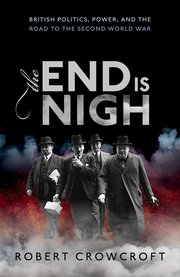
Finest Hour 184
Books, Arts, & Curiosities – Fearful Levity

June 26, 2019
Finest Hour 184, Second Quarter 2019
Page 43
Review by Ted R. Bromund
Dr. Ted R. Bromund is the Senior Research Fellow in Anglo-American Relations at the Margaret Thatcher Center for Freedom in The Heritage Foundation.
Robert Crowcraft, The End Is Nigh: British Politics, Power, and the Road to the Second World War, Oxford University Press, 2019, 304 pages, £25. ISBN 978-0198823698
The shadow of Maurice Cowling hangs heavy over Robert Crowcroft’s The End Is Nigh: British Politics, Power, and the Road to the Second World War. Cowling’s The Impact of Hitler, published in 1975, was an influential challenge to historical orthodoxy. Writing from the disenchanted perspective of an English conservative embittered by the economic and political depths to which post-war Britain had by that point sunk, Cowling treated the approach of the Second World War not as a study in the failure of appeasement. Rather, dismissing the impact of ideas, he saw it as struggle in which naked political ambition defined British policy. It is, as Crowcroft states, a “highly sceptical way of looking at politics.”
As Cowling intended, the effect of this approach is to draw the rise of Hitler in shades of grey, making fundamental differences over great issues appear petty and implying that the war was a mistake deriving from the errors of small men. Crowcroft paints from Cowling’s palette, arguing that in the 1930s, and especially after 1935, “British foreign policy was British politics.” The only difference between the contending politicians was that, while Stanley Baldwin, Neville Chamberlain, and the Labour Party were all driven by a pursuit for power, Winston Churchill was so consistently unprincipled, ambitious, and wrong that the war in which he helped to embroil Britain in 1939 made him a menace to British power, British greatness, and the British Empire. Between them, they show what happens when “the competition to rule a democratic polis overwhelms the system.”

2025 International Churchill Conference
Crowcroft applies himself to his task of diminishing his subjects with energy. He repeats the myth about Churchill’s “black dog” and the lie about Churchill’s use of troops against the Welsh miners in 1911. Rhetorically, he is fond of the slighting aside: after 1924, we are told, Churchill’s Chartwell was a beloved home for “respite and intrigue.” He cleverly concedes obvious truths not by rejecting them, but by brushing them aside: “to be sure, this was a complex situation,” he generously acknowledges about the 1930s. But his central charge against Churchill is that Churchill was a dangerous adventurer who lacked any consistency apart from his pursuit of power. Thus, Churchill campaigned against the India Act of 1935 for careerist reasons, fighting on “very personal battle lines.” He chose more wisely when he made “British rearmament and the German question…the twin outlets for his ambition,” but he never grappled with the limits of British power, confining himself to “defiant, emotionally-satisfying rhetoric.”
The slipperiness of Crowcroft’s method is best illustrated by his handling of a single quotation. On 28 July 1914, Churchill wrote his wife Clementine that “Everything tends towards catastrophe & collapse. I am interested, geared up & happy.” Crowcroft allows the reader to assume that Churchill loved war. But he fails to quote Churchill’s next sentences: “Is it not horrible to be built like that? The preparations have a hideous fascination for me. I pray to God to forgive me for such fearful moods of levity. Yet I wd do my best for peace, & nothing wd induce me wrongfully to strike the blow.” Churchill was far more complex than Crowcroft allows— as, in their own way, were the other politicians he denigrates. But slight by slight, Crowcroft digs a rhetorical ditch that channels the reader toward his conclusion.
The gravamen of Crowcroft’s argument, as with Cowling’s before him, is that the Second World War as we know it resulted from Britain’s folly in issuing a guarantee to Poland. Britain should instead have “turned the Eurasian landmass into a deadly morass for those states with revisionist aspirations.” The key to this happy outcome—from Britain’s perspective—was for Britain to force Nazi Germany and Soviet Russia to fight each other by not trying to control the geopolitics of Eastern Europe. But trapped in a political system increasingly defined by the feckless liberalism of the League of Nations Union and Churchillian war-mongering, and refusing to recognize the folly of France’s effort to constrain Germany with a belt of Eastern allies, Chamberlain failed to choose this path. The result was the war, and, most importantly from Crowcroft’s perspective, the exhaustion of British national and imperial strength.
The best that can said of this plan is that it would have been exceptionally risky. The fundamental problem, as the Great War had demonstrated, was that Germany was so strong that, if it chose war, it could only be constrained by Britain, France, and Russia in alliance, backed by US economic and, ultimately, military power. If the dictators had indeed gone to war in 1939 instead of 1941, one of them would likely have won: as the war proved, neither Hitler nor Stalin was the quitting type. Either the Communist armies would have marched west into the heart of Europe or—more likely—Germany would have conquered the greater part of Eurasia, leaving a dead Stalin and a rump Russia.
Britain’s fundamental interest was, as always, to ensure that no single power dominated Europe. By the mid-1930s, Germany was the power most immediately likely to dominate Europe and so, painful as it was, the correct course of action for Britain was to focus on containing or defeating Germany. If British politicians had to talk about collective security to make that course of action palatable to the public, so be it: what was needed was rearmament and alliances. That is precisely what Churchill called for. It is no contribution to understanding Churchill’s strategy, or indeed the forfeits Britain faced by the mid1930s no matter what it did, for Crowcroft to describe Churchill’s view as “plainly nonsense.”
The only thing novel about Crowcroft’s thesis is the baldness with which he offers it: not for nothing does he have kind words for revisionists like John Charmley, who in his telling have failed only by not tearing down Chamberlain as well as Churchill. Crowcroft is certainly right to point out the damaging effects that foolish ideas about the League of Nations had on Britain’s willingness to think seriously about how to defend its interests, and the brickbats that he tosses at Labour’s refusal to support rearmament while at the same time it yammered on about collective security are well-aimed. It should of course be a truism that domestic politics and personal ambition affect foreign policy. But sincere disagreements and differing ideas matter too. The story Crowcroft tells is made for a distrustful and reductionist age—but that is our problem, not reality’s.
By approaching the 1930s as a study in British political failure, Crowcroft presents himself as the advocate of a better world that might have been if only Britain’s policy-makers had acted differently. But if Crowcroft is right that democratic foreign policy is best understood as a cynical story of vain men and the catastrophes they create, then democratic Britain was, by his own telling, bound to pursue the policies he condemns. He posits a policy that could only have been adopted through an act of leadership in the national interest as he defines it, yet his view of politics accepts that politicians understand the national interest as merely a function of their own self-interest. He calls for leadership while denying it exists except as an expression of selfishness. He demands high politics, but sees them as necessarily low.
Yet great democratic leaders, while rare, do exist. We all know one example of such a leader. Historians who deny this reality only help to create the problem they pretend to decry.
Subscribe
WANT MORE?
Get the Churchill Bulletin delivered to your inbox once a month.





